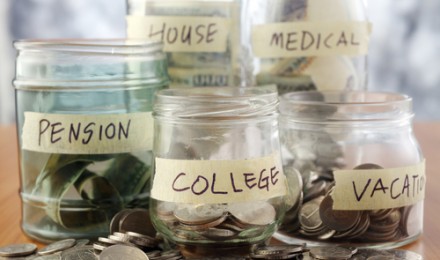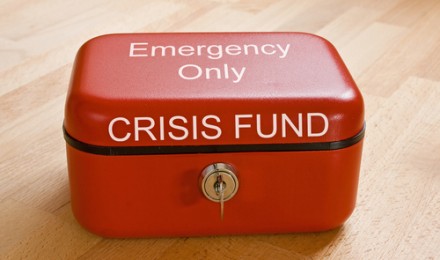Saving money for the unexpected is fundamental, especially in today’s economic climate. Many financial professionals suggest that an emergency fund should be at least 6 months worth of expenses. Some will say as much as two years worth of expenses. David Bach, author of the book “The Automatic Millionaire” puts it simply as having enough money to sleep comfortably at night. If you are up worrying about what would happen if you lose your job, then you need to have more in an emergency fund. And the best way to save is to have money deposited into a money market account or savings account automatically whenever the paycheck comes in. This will not only force you to save the money, but it will also force you to follow your budget. As soon as the money comes in and the savings portion of the budget is satisfied, there will be less of a chance to spend the money absent-mindedly. Bankrate.com has a method of finding a savings or money market account based on institution, yields, or several other factors.
The best way to find money to fund your emergency fund is to sit down to create a budget. Keep a keen eye out ways to reduce discretionary spending. Take the savings and invest it in your retirement or save it for emergencies or big purchases like the down payment on a house. Without a budget, it often seems as though there is no money leftover and you may feel as though you are living paycheck to paycheck. Finding the “extra” money is only part of the solution, it must be put to good use or else it will be wasted just as it was in the past. Now the extra money can be saved and invested, allowing you to use it in the case of a future emergency or retirement.
While an emergency fund is important, saving money for retirement is also important. American’s are bad savers. Make sure that you put aside a portion of the money not spent on necessities to invest for later use. Until the emergency fund is large enough that you feel comfortable, split your new savings between your emergency fund and your retirement accounts. To maximize the tax advantages, consider either a regular or Roth IRA. As long as you meet the eligibility requirements are met, take advantage of the government’s contribution toward your retirement. Fund your IRA the same way as you funded your emergency fund. Set up your IRA so that your bank deducts the IRA contributions the day your paycheck clears your account.
Most people would prefer to save more money, but realistically money is tight and saving for tomorrow means doing less today. But this does not mean that you need to eliminate all the discretionary spending from your budget. Your budget will still maintain an “entertainment” section. The money you save will come from taking care not to overspend on the discretionary side, so there is cash available in the event of an emergency and your putting money away for retirement.
Saving money for the unexpected is fundamental, especially in today’s economic climate. Many financial professionals suggest that an emergency fund should be at least 6 months worth of expenses. Some will say as much as two years worth of expenses. David Bach, author of the book “The Automatic Millionaire” puts it simply as having enough money to sleep comfortably at night. If you are up worrying about what would happen if you lose your job, then you need to have more in an emergency fund. And the best way to save is to have money deposited into a money market account or savings account automatically whenever the paycheck comes in. This will not only force you to save the money, but it will also force you to follow your budget. As soon as the money comes in and the savings portion of the budget is satisfied, there will be less of a chance to spend the money absent-mindedly. Bankrate.com has a method of finding a savings or money market account based on institution, yields, or several other factors.
The best way to find money to fund your emergency fund is to sit down to create a budget. Keep a keen eye out ways to reduce discretionary spending. Take the savings and invest it in your retirement or save it for emergencies or big purchases like the down payment on a house. Without a budget, it often seems as though there is no money leftover and you may feel as though you are living paycheck to paycheck. Finding the “extra” money is only part of the solution, it must be put to good use or else it will be wasted just as it was in the past. Now the extra money can be saved and invested, allowing you to use it in the case of a future emergency or retirement.
While an emergency fund is important, saving money for retirement is also important. American’s are bad savers. Make sure that you put aside a portion of the money not spent on necessities to invest for later use. Until the emergency fund is large enough that you feel comfortable, split your new savings between your emergency fund and your retirement accounts. To maximize the tax advantages, consider either a regular or Roth IRA. As long as you meet the eligibility requirements are met, take advantage of the government’s contribution toward your retirement. Fund your IRA the same way as you funded your emergency fund. Set up your IRA so that your bank deducts the IRA contributions the day your paycheck clears your account.
Most people would prefer to save more money, but realistically money is tight and saving for tomorrow means doing less today. But this does not mean that you need to eliminate all the discretionary spending from your budget. Your budget will still maintain an “entertainment” section. The money you save will come from taking care not to overspend on the discretionary side, so there is cash available in the event of an emergency and your putting money away for retirement.







